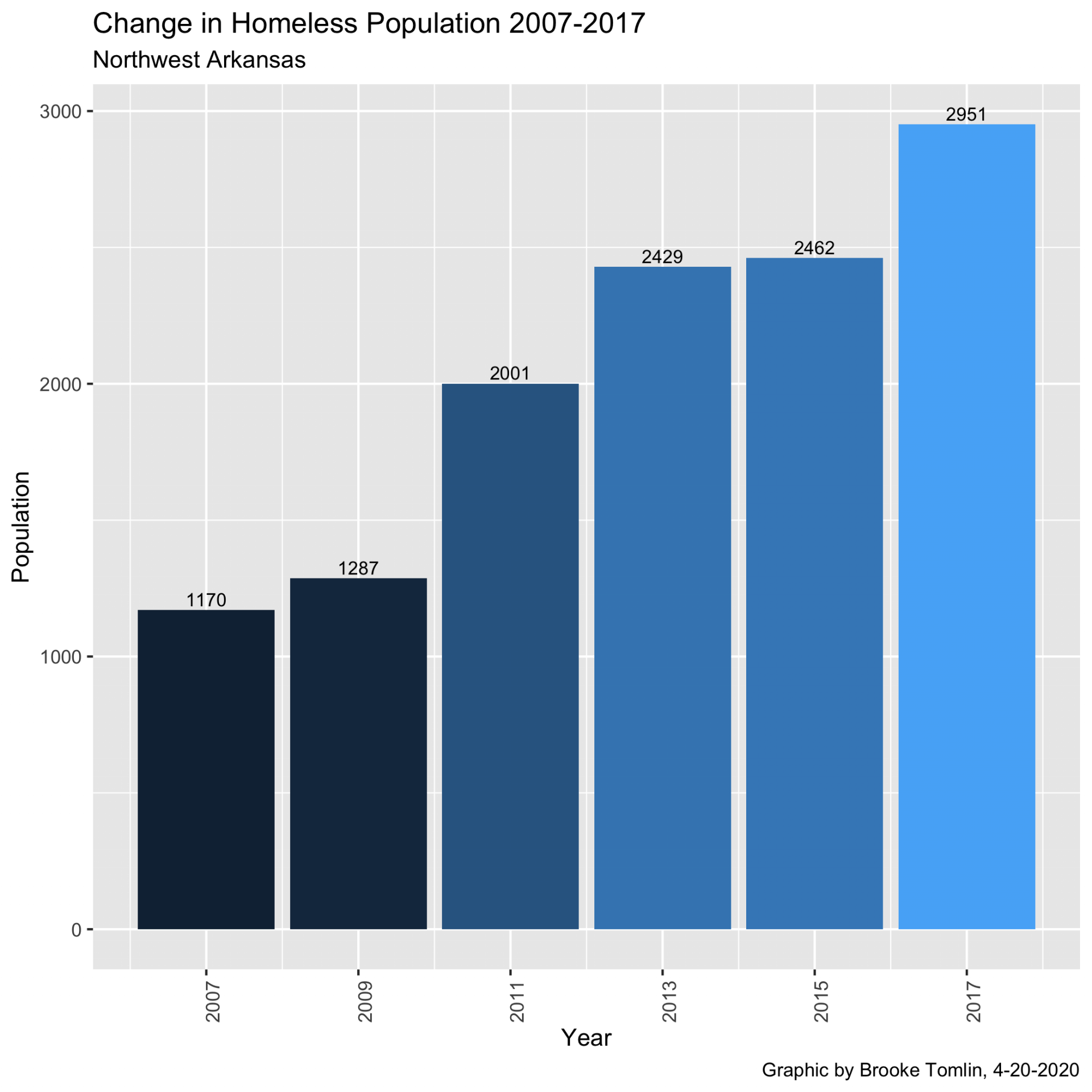Affordable Housing Shortage
Plays Big Role in Fayetteville
Homeless Problem
By Brooke Tomlin and Elena Ramirez
The Razorback Reporter
U.S. News and World Report ranks Fayetteville, a college town tucked in the northwest corner of Arkansas, as one of the best places to live, thanks to the University of Arkansas, a vibrant music and arts scene, beautiful parks and a big mountain biking culture. What isn’t widely known is Fayetteville is struggling with a significant homeless problem.
The Fayetteville School District has an average of 306 homeless children, or about about 2% of the district’s enrolled students, in the 2018-19 school year, according to the Arkansas Department of Education.
“I believe one of the major factors of why Fayetteville has homeless families is the lack of affordable housing in Fayetteville,” said Lisa Hughey, Families in Transition Coordinator for Fayetteville Public Schools.
Kevin Fitzpatrick, a University of Arkansas sociology professor who studies homelessness, said the population in Washington and Benton counties grew 12% between 2007 and 2017 while the homeless population grew by 152%.
One face of the homeless population is Conrad Kundle, who has been homeless for 3 months after he said he was injured while working at a construction site in Bentonville. The accident left him without a good paying job and an apartment.
Kundle said he is now making a $10 an hour wage at a car wash and he supplements this by emptying the vacuum cleaners, where he would find $15 to $30 a day in change and gift cards.
“I consider myself, no matter what, a survivor.” Kundle said.

Kundle’s attempts to get back on his feet are common struggles seen by the Fayetteville school counselors.
“The low-income housing is becoming more and more obsolete. We see a trend of people moving from different areas of Arkansas and not realizing what the housing situation looks like here and they set themselves up to fail because they can’t afford it,” Hughey said.
Property prices, while relatively low nationally, have been on the rise in Fayetteville, which raises affordability concerns for many. In the last 10 years, overall house and apartment rents increased by 22% in Fayetteville from an average $884 to $1,083 in 2019, according to the Zillow Rent Index, which measures rents for multifamily, single-family homes, condos and co-ops.
One element of that growth has been the expanding student population at the University of Arkansas. The University of Arkansas’ student population has increased by 29% in the past decade from 21,405 to 27,559, according to the Office of Institutional Research and Assessment. Steve Clark, the chief executive of the Fayetteville Chamber of Commerce, said this enrollment growth led to an influx of corporate money from outside of Arkansas to build student housing.
“Student housing is a very profitable business here,” said Steve Clark, the chief executive of the Chamber of Commerce. “So, these weren’t local landlords’ buildings. These were major corporation buildings … They had a direct impact on the existing housing inventory.” Some of the new student housing projects carry above-market rents, such as Uptown Apartments, where rent for a single bedroom can cost $1,075 to $1,415, according to its website.
Aside from the student population increase, Northwest Arkansas is becoming one of the nation’s 100 largest metropolitan areas as the region has grown 19% percent in the last decade, according to the U.S. Census Bureau. Northwest Arkansas will continue to see an increase in people every day.
Fayetteville is widely viewed as a prosperous community with job opportunities, “but for a lot of our families that are working families and are living off of minimum wage, the rent is so high that it’s hard for them to keep up and continuously sustain that housing,” said Sara Blickenstaff, social worker for Fayetteville Public Schools. “A lot of our families get evicted because of non-payment and then they have to either double up with a family member or friend.”
In 2019, 15.2 percent of the population in Washington County lived below the poverty line. According to the U.S. Department of Health and Human Services, poverty for a two-person household is defined as $16,910, and for a four-person household is defined as $25,750.
The Fayetteville School District has programs in place that assist low-income families and students who find themselves homeless and worried about how they will get their basic needs met. The Families in Transition program, with the help of a federal homeless assistance law called the McKinney Vento Act, helps students and families with enrollment, school meals, and transportation. It also aids children and families with school supplies, clothing, and other resources in the community.
Fayetteville Public Schools identify hundreds of students who meet the guidelines for homeless under the McKinney Vento Act. The McKinney-Vento Act is a federal law that is designed to ensure homeless students can go to school.
Every year, the Fayetteville Public Schools sees an increase in the number of homeless students in the district. The number of children and youth in the Fayetteville School District grew 58.6% between 2012 to 2019.
